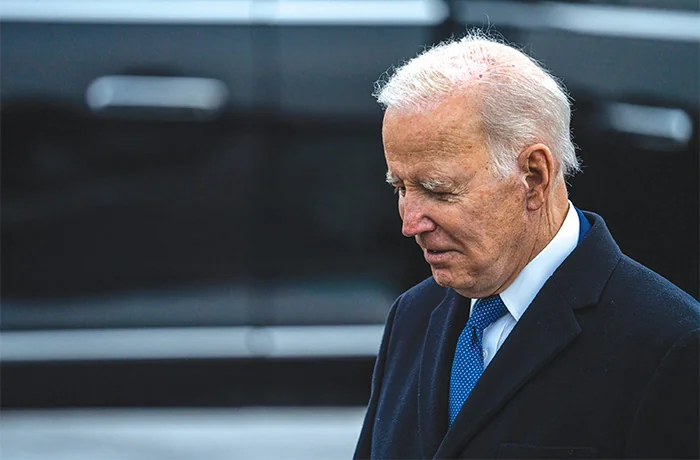The cover-up of former President Joe Biden’s age-related decline is as much a media scandal as a political one. An appropriately skeptical press would have asked consistently penetrating questions about the oldest president in history and continued to press the issue when it was clear the White House was hiding something (often, the president himself). Instead, they often supplied a megaphone to the defenses of Biden in what were meant to be straight news stories.
If political advisers are always supposed to present the principal in the most favorable light they possibly can, though some new Biden details suggest this went well beyond any normal advance work, the media are not supposed to do anything of the sort. That is why the reappraisal of Biden’s physical and mental abilities while in office has so far done little to reassure the public.
The Biden reelection campaign was framed as a defense of democracy against a unique threat: his predecessor, and the man who would become his successor, Donald Trump. This theme of defending democracy became an all-purpose justification for a series of undemocratic things: avoiding a competitive Democratic primary process in 2024, revamping the primary calendar to be favorable to Biden, enlarging the role of Biden aides who were not elected or confirmed by the Senate in governing the country as he aged, and then, when all else failed, replacing Biden with a nominee who did not receive a single primary vote and ran unopposed at the party’s Chicago convention.
It’s poetic justice, perhaps, that despite all these machinations, Trump won the popular vote for the first time in three national campaigns. But the question remains whether the media, which had in many cases mishandled stories ranging from Trump-Russia to the 2023-24 lawfare campaigns against the former and future president, saw themselves as defending democracy against Trump when providing largely kid-glove coverage of Biden.
When CNN’s Jake Tapper went on his book tour, he probably did not expect it to turn into an apology tour. Yet that is what has happened as his media blitz has quickly given way to mea culpas.

“Knowing what I know now, obviously I feel tremendous humility about my coverage,” Tapper confessed to Megyn Kelly when he joined her influential podcast to discuss the book he coauthored with Alex Thompson, a reporter for Axios, Original Sin: President Biden’s Decline, Its Cover-Up, and His Disastrous Choice to Run Again, published in May by Penguin Random House.
“That Lara Trump interview, for example — she saw something that I did not see at the time,” Tapper continued. “One hundred percent. And I own that.” Here, Tapper is referring to a 2020 interview he did with Lara Trump in which he accused her of ridiculing Biden’s stutter at an event. She replied that she “had no idea that Joe Biden ever suffered from a stutter. I think what we see on stage with Joe Biden, Jake, is very clearly a cognitive decline.”
“You are so amazing,” Tapper shot back. “‘A cognitive decline.’” The CNN anchor now says he apologized to Lara Trump “months ago.” He added, “But yeah, I mean, of course, I look back at my coverage with humility. And I wish I had covered the issues of age and acuity — but I wish I had covered them much more.”
Yes, Biden was enabled by people around him, including his family and White House staff. They took steps to limit the exposure of his infirmities to Beltway elites and the general public. The former president was stubborn, an 82-year-old man clinging to a job he had been campaigning for since at least 1987 and asking voters to allow him to keep it past his 86th birthday.
But it was the task of the press to report facts that would help voters understand whether Biden was up to doing that highly coveted job. While voters came to doubt Biden’s fitness to serve, according to numerous polls, there was little appetite for covering these stories outside of conservative media. (In giving him an award for his 2024 coverage of Biden, the White House Correspondents’ Association seemingly acknowledged Thompson was a rare exception to the rule.)
The steady stream of new accounts examining Biden’s limitations as president contains revelatory details and interesting color. But they don’t reach conclusions about Biden’s condition that are markedly different from those most voters, including many rank-and-file Democrats, arrived at on their own simply by watching him. And they put more blame on Democratic politicians and Biden aides than on the media.
Reading the Washington Examiner would have helped voters gain insight into Biden’s age problem years before the flood of books only now being published after he left office. “Whatever their differences, the two front-runners in the Democratic presidential race, Joe Biden, born November 20, 1942, and Bernie Sanders, born September 8, 1941, share one common trait: They are too old to be president,” chief political correspondent Byron York wrote in April 2019.
“And that fact is, Biden, now 77, has clearly slowed down,” York wrote in late July 2020. “He does not appear to be as vigorous as he was during his 44 years in the federal government. … At the moment, Biden is facing very little commentary and criticism about his age. There was more discussion of age when Republican John McCain, who would have been 72 had he been elected, ran in 2008, and when Republican Bob Dole, who would have been 73, ran in 1996. But Biden, who would be 78, attracts less talk.”

Editor-in-Chief Hugo Gurdon described Biden as an “old man in a new world” in March 2020. “The problem with bygone eras, however, is that they are bygone,” he wrote. “There is no going back. Biden is avowedly yesterday’s man; his rhetoric is all about (dubious) past achievements.”
“President Joe Biden’s great age and concomitant physical and mental decline have been subjects of intensifying contention since before Democrats first chose him as their leader in 2020,” Gurdon wrote in late 2023, nearly 190 days before Biden’s catastrophic debate with Trump. “Back then, he was only — only! — 77 years old. Now, he is 81, and if he is reelected, he’ll swear his oath of office at the age of 82. If he makes it through a second term, he’ll quit the White House at 86.”
Gurdon added that Biden’s “aides and first lady Jill Biden do their best to manage his schedule and lighten his load. They want to reduce his commitments, so he doesn’t tire himself out, thereby cutting down on opportunities for him to embarrass himself and the rest of us at our choice of president.”
David Freddoso wrote for the Washington Examiner magazine in February 2024 about how some progressive Democrats saw Biden’s deficits as an asset. Their case was “that Biden does not matter. He might have the title of president, but it is the young, radical aides from the Obama era who are really running the country in his name.”
Megyn Kelly, her former colleagues at Fox News, and many others in conservative media raised similar questions about Biden. Only intermittently did those inquiries escape from that bubble.
Biden had promised to be a “transitional” candidate. But in his dotage, the transition may have come early as younger, more progressive staffers tied to Democrats who likely could not have won the 2020 presidential election operated with limited supervision. These aides concluded their policy wins justified returning Biden to office, no matter his condition.
“He just had to win, and then he could disappear for four years,” Original Sin quotes one such Biden staffer as saying. “He’d only have to show proof of life every once in a while. His aides could pick up the slack.” Democracy, this is not.
But many in the media regretted how they covered the 2016 presidential election, which Trump had won. They thought they paid excessive attention to Trump’s campaign rallies before they took him seriously enough as a candidate. These reporters lamented giving something approaching equal time to Hillary Clinton’s emails, a regret that only deepened once Trump was charged with mishandling classified documents himself. They weren’t going to repeat their mistake by doing the same thing with the Biden age issue, which itself was amplified by a classified documents scandal and investigation.
Even so, there were reports about how Biden’s age could have become a political liability even before then-special counsel Robert Hur’s reporting describing the then-president as an elderly man with a bad memory. “Could Democrats and their allies in America’s newsrooms have nudged or even muscled Biden out of office?” Noah Rothman asked in National Review during one such wave of coverage in September 2023. “A president who wants to remain president is extremely difficult to dislodge from office. But it’s not impossible to imagine a popular groundswell in which the press, backed by supermajorities of Democrats, had successfully applied all its leverage with the aim of convincing Biden to bow out at the end of his first term.”
At the time, Rothman thought the Democrats’ and the legacy media’s moment had passed. But this exact scenario unfolded much as he described it in the aftermath of Biden’s dreadful June 27, 2024, debate showing. That’s when the press as a whole, without any “conservative” qualifier, turned sharply against Biden as it appeared he was not up to beating Trump a second time.
One issue was surely that Democratic sources were then willing to come out of the woodwork to talk about their own experiences with, or lack of unfiltered access to, Biden. Olivia Nuzzi’s New York magazine piece came out seven days after the debate. There was clearly some reporting in the can.
When the Wall Street Journal’s Annie Linskey and Siobhan Hughes reported in early June 2024 that Biden was “slipping” behind closed doors — one of the White House’s defenses of Biden was how sharp he was in private settings, conveniently outside the cameras’ view — many of the on-the-record sources were Republicans. Democrats publicly disputed the story. After the debate, some Democrats who had participated in this pushback began calling for Biden to reconsider his reelection campaign.
Some outlets undoubtedly preferred to have concerns about Biden’s age and capacity to run or serve come from Democrats rather than let Republicans repeat their familiar criticisms of “Sleepy Joe.” Man bites dog, Dems bite Biden. After the debate, more Democrats were willing to go on the record with these complaints, and it’s likely that editors were more comfortable running what was still on background.
“The editors who drove a lot of these coverage decisions will remain quiet and hidden,” Axios reporter Marc Caputo wrote on X. “They’ll never fess up. They’ll never look inward. They’ll let the reporters take the criticism for the decisions they made.”
But that doesn’t explain the near-uniformity of the coverage decisions, the eagerness to accept the White House’s framing of age and decline stories by people who observed Biden more regularly than concerned voters did, or even confident proclamations that Biden was totally fine. The most famous example of the last phenomenon is MSNBC’s Joe Scarborough, who was a congressman while Biden was still in the Senate.
“This version of Biden, intellectually, analytically, is the best Biden ever,” Scarborough asserted in March 2024, after calling the then-president “more than cogent.” The Morning Joe host finally admitted on May 21 that he was “obviously wrong.” (Albeit with more caveats than he applied to his original statement.)
In the days leading up to the fateful presidential debate, several top media outlets largely took the White House’s word that videos that appeared to show Biden’s infirmity were deceptively edited “cheap fakes.” A Washington Post fact check said this footage “enraptured right-wing media” even as they “deeply mislead.” The publication also ran the headline “How Republicans used ‘cheap fake’ videos to attack Biden.” Just three days before the debate upended Biden’s campaign, the New York Times drew equivalency between concerns about his age and the accuracy of videos being circulated by Republicans.
A week before the debate, NBC News fretted about whether the fact-checkers would be able to stay on top of all the viral videos purporting to show a doddering Biden. “The lie is sprinting the 100-meter dash and the fact check is taking a stroll on the beach. So it’s never going to catch up. And it’s never going to have the same reach,” the outlet quoted Democratic strategist Eric Schultz as saying. Days before that, Schultz disputed a New York Post story about Biden being led off the stage at a Democratic fundraiser by posting on X, “This did not happen.”
But after the debate, Hollywood celebrity George Clooney cited his experiences at that fundraiser in a New York Times op-ed calling on Biden to drop out of the race. Clooney said Biden was no longer the man he knew. Tapper and Thompson report in Original Sin that Biden did not recognize Clooney at the big-dollar event. Former President Barack Obama and others were said to be concerned about Biden’s performance.
The whole “cheap fakes” concept, as opposed to manufactured “deep fakes,” left evaluations of the Biden footage to the beholder’s subjective judgment. One could always quibble about how accurately a video is edited. Some widely circulated by partisan sources were certainly unfair to Biden. Reporters should not take the Republican National Committee’s word for it any more than the White House’s. But these videos, even when imperfect, came closer to painting a truthful picture than the official Bidenworld spin.
The obviousness of it all is now being used to defend how Biden was covered. Mark Leibovich unloaded in the Atlantic about “why I think that the ‘cover-up’ of Biden’s ‘true condition’ is beside the point — and why I’m not really vibing with the umbrage-mongering: It’s pretty much impossible to ‘cover up’ for something that is hiding in plain sight.”
“Democrats could trot out as many White House officials as they wanted to claim I was with the president just this morning, and he was sharp as a tack and running circles around staffers less than half his age,” he continued. “But whenever Biden was allowed to go out in public — a rarity, which itself was a red flag — the public’s preexisting consensus about his infirmity was only reinforced.”
Journalistic problems with this take aside, Leibovich sang a different tune in 2023. “It’s not just making an issue of Biden’s age, it’s lying,” he said on a PBS roundtable show. “It’s saying he’s senile, saying he’s demented, saying he’s out of it.” Atlantic Editor-in-Chief Jeffrey Goldberg responded, “Right. Mentally, he’s quite acute.” Leibovich then replied, “It seems like it.”
Fast-forward to May 2025, when Leibovich wrote, “Biden was in no position to keep doing his job given his condition, which had been evident for years to most people paying even casual attention.”
Leibovich, nevertheless, highlights, however tendentiously, an important point: Biden has spoken on television and in public for decades. He was a two-term vice president who, before that, was a senator for 36 years. He was elected president on his third try. His diminishment as a communicator, at least, was obvious to anyone covering him. And Biden’s public schedule both suggested that the White House was cognizant of that decline and that there was, as Tapper and Thompson write in their book, “a limit to the hours in which he could reliably function.”
There was nothing former White House press secretary Karine Jean-Pierre or top advisers such as Anita Dunn or $4 million man Michael Donilon could say that would alter what voters — or journalists, for that matter — could see and hear for themselves.
What the voters could not see, and what is now only being widely reported after the fact, is how the Biden White House was being run. Now, Donilon, former White House chief of staff Ron Klain, top policy adviser Bruce Reed, counselor to the president Steve Ricchetti, and Jill and Hunter Biden are being described in Soviet-like terms as a close-knit group called the “politburo.” They limited Biden’s exposure to the rest of the White House staff and made important decisions. “Five people were running the country, and Joe Biden was at best a senior member of the board,” Tapper and Thompson were told.
A real test of whether anyone has learned anything will be how the larger media treat questions surrounding Biden’s prostate cancer diagnosis and transparency about his health while he was still president. Those questions should be handled sensitively, given the severity of Biden’s condition, but they still need to be asked and answered forthrightly.
So far, it has been a mixed bag: several nuanced interviews with urologists and other medical experts discussing the odds that Biden’s cancer would have appeared so suddenly, but also an at least arguably disproportionate focus on what Trump is saying, almost always “without evidence,” about the matter. Some Democrats have urged that the discussion be “muted” as Biden recovers. But it is still early.
DEMOCRATS SUGGEST A ‘PAUSE’ IN BIDEN HEALTH TALK AFTER CANCER DIAGNOSIS
“Alex and I are here to say the conservative media was right and conservative media was correct and that there should be a lot of soul-searching, not just among me, but among the legacy media,” Tapper told Kelly.
We’ll see how many others take that lesson.
W. James Antle III is executive editor of the Washington Examiner magazine.























